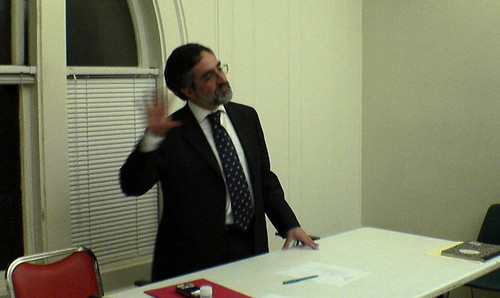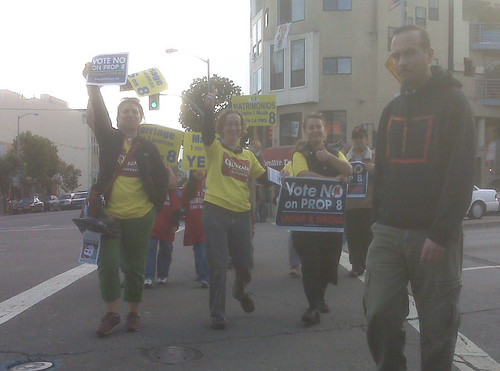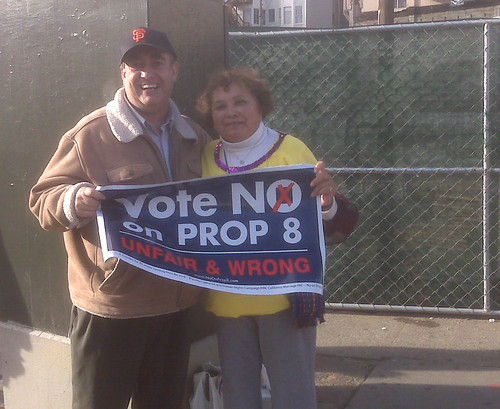President of the San Francisco Board of Supervisors Aaron Peskin spoke at a packed meeting of the Harvey Milk LGBT Democratic Club yesterday, and here are some of the things he said:
He opened by calling the current Board of Supervisors the most progressive 6 years stretch of the Board ever, but emphasized that we need to ensure that when he and three other members of the 2000 Progressive Sweep are termed out in 2008, the people we elect are at least as progressive as the outgoing Supervisors. “Chris Daly thinks we can trade up”, he said, but we need to start now recruiting good candidates to run.
more on the flip…

He mentioned there is a movement afoot to extend term limits in San Francisco as well as at the state level, and he’d welcome that.
One thing he thinks could be a factor against maintaining a progressive majority at the board is the upcoming fight between Leno and Migden. He compared it to Ammiano’s run for mayor in 1999, where the run actually helped kick off the momentum that led to us making such huge gains in 2000. He worries that this race, however, will end up fracturing the queer and progressive communities, which will make it that much harder to do the work we need to do in November. “It’s a disaster waiting to happen”, he said, adding that he would enter the race himself if that would somehow help.
He denied that he is running for mayor, even when members of the audience offered to dust off their “Run Aaron Run” buttons from last time. When asked about Newsom, he pointed out that the Mayor’s taking credit for a lot of things he didn’t actually do, like the Health Access Plan, but “as long as we have the plan, and it’s fully funded, I don’t care who takes the credit.” It would be an uphill battle to defeat Newsom, he said, unless the situation changes, “Maybe the third shoe will drop.”
He reserved his harshest criticisms of Newsom for Proposition A, the affordable housing bond. The bond lost by one percent, Peskin pointed out, and
if the mayor had shown one iota of leadership, had shown up to one thing, we would have won Prop A. He has all this political capital [from his 70% approval rating] and he does nothing with it. Political capital only means anything if you spend it. It’s not who dies with the most toys wins.
Peskin admitted that when it came to the rising tide of violence in San Francisco, the Board doesn’t have all the answers, “It’s one of the most vexing things we have to deal with,” but he did point to the passage of foot patrols, and the beginning of “a serious conversation” about community policing, which he complained means different things to different people. “One thing we can do is make sure we have the services in place that people need.”
I asked Peskin about his position on the Wi-Fi network, and he sees it pretty clearly as an attempt to create a franchise like with cable, and “I will never vote for another franchise.” He sees fiber as the way forward, first as the backbone for a hybrid-style network, then eventually to everyone’s door. He feels that signing the Earthlink deal will impede moving forward with such a network. I didn’t get a chance to ask about the digital inclusion aspects of the issue, but when someone else asked him about why the mayor was pushing this so hard, Peskin’s answer was that “administrations, especially when you’re a man, are judged by what you build. So everyone says, ‘Joe Alioto, he built the Transamerica Pyramid!’ and ‘Willie Brown build Mission Bay,’ and Gavin wants to build something too.” He went on to say he thought Newsom should be proud to point to the “civil disobedience” of the 2004 gay marriages as an accomplishment, and that as long as Newsom’s going to take credit for the health plan he could take credit for that, too. Perhaps most revealingly, he claimed that “the Mayor knows this [the Earthlink deal] is a lost cause.”
He also touched on the Ethics Commission (ours is understaffed compared to San Jose and LA), condo conversion limits (he’s for maintaining them at the current level, although he’d have been willing to increase the number in exchange for a deal on TICs), the police (he still wishes there was a way to get them to live in San Francisco) and a few other issues I didn’t get a chance to write down and don’t remember.
cross-posted at Left in SF (note that all quotes are as I wrote them down, and have not been verified for accuracy, and the rest is my paraphrase from memory)




